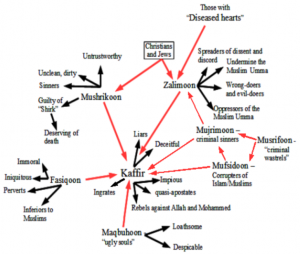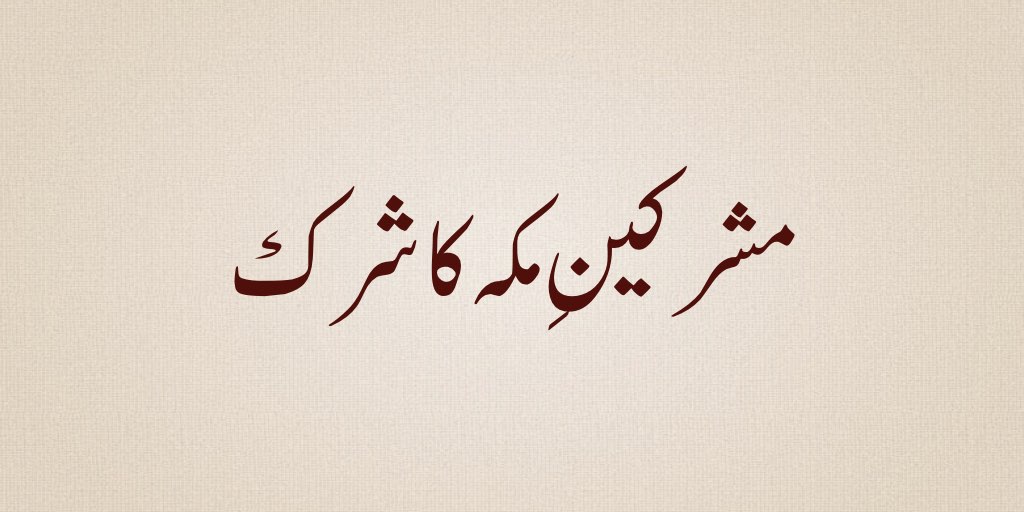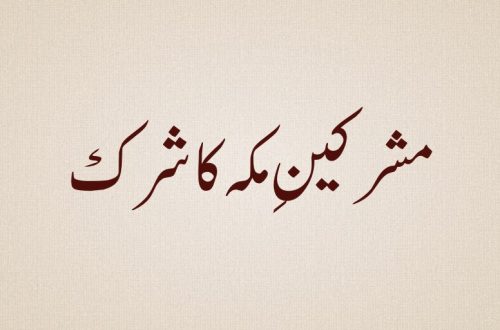By Jon MC
In parts one and two I analysed how various words and phrases are used to (partially) describe the character given to non-Muslims by the Koran.
In this third part I intend to show, firstly, how the various words used to describe non-Muslim are inter-related more visually and, secondly, to discuss something of the out-workings of this in relationships between Muslims and non-Muslims.
The Inter-relationships between the various words used are shown in the diagram below.
Black arrows show the unique attributes of the various words used to describe non-Muslims, red arrows show primary directional links between them.

Note that in this web I have not recorded all the duplicate attributes of the words used. Starting with “Kaffir” I recorded above the direct attributes of the word as stated in the Koran. Thus when “Mushrikoon” are also called ‘liars’ since this is not a unique attribute of a Mushrik it has been omitted. Thus many reinforcements of the Koran’s negativity towards non-Muslims have been omitted in the web above for the sake of (relative) brevity and clarity.
Note that all these primary words are interrelated (as the red arrows show). Thus although there is no direct linkage between (e.g.) Musrifoon and Kaffir – thus one might imagine that they are distinct in that the characteristics on the one are not those of the other – this is not so because “al-Musrifoon” are also “al-Mufsidoon” and “al-Mujrimoon” and Kaffirs are described as both “al-Mufsidoon” and “al-Mujrimoon”.
Thus Kaffirs also partake of the characteristics of “al-Musrifoon”.
When we turn to the out-workings of these words in Muslim non-Muslim relationships, the first point to note is that the attributes of all these words are all very negative, even hateful.
A second point is that Jews and Christians are both considered to be Zalimoon and Mushrikoon and thus, for all the fact that they are “people of the book”, are also Kaffirs.
Indeed the Koran explicitly calls those Jews and Christians who stick to their own faiths the “disbelievers [Kaffirs] amongst the people of the book” (see for example K.3:110-117.) In other words Jews and Christians who do not convert to Islam are practitioners of “Khufr” (the act and practice of rejecting Islam), which in turn makes Jews and Christians Kaffirs.
True, they are Kaffirs who have the ‘privilege’ of being allowed to keep their religion and property (which term under Islam includes, let us not forget, their wives and children) by accepting Dhimmitude, but they are Kaffirs nevertheless and may only “hold off the sword” by payment of Jizyah.
And as Kaffirs, Christians and Jews (and any other groups also considered “people of the book”), have all the negative attributes listed above, although the Jews have extra pejoratives heaped upon them as well – which explains why they are the most hated by Muslims.
There are many other verses in the Koran which excoriate non-Muslims and further blacken their character. The Koran, quite literally, has not a single good word to say about non-Muslims.
(I challenge any reader to find a verse with any of the words discussed in parts 1 and 2 that is positive about non-Muslims. I would be delighted to find I had missed a positive reference.)
Many Muslims are not “haters” of non-Muslims and are generous to a fault. What this means is that they have risen above their religion in response to common humanity.
But any Muslim who reads his/her Koran attentively, with understanding and believes it must come away with a very negative (one might say hateful) view of non-Muslims who are cast as seeking to undermine Muslims and destroy Islam, no matter how tolerant the non-Muslims may be in reality. Implicit in the “Muslim mind” is that the tolerance of non-Muslims is only a mask, the Koran tells Muslims what the non-Muslims “real” feelings and attitudes are.
Thus there can be no true reciprocity in tolerance. For Muslims to do so would be to expose themselves to the evil of “fitnah” (dissent, discord, etc). This also goes some way to explain why “religious freedom” in Islam is defined as the freedom to fully practice Islam in the complete absence of khufr (disbelief) and why Islam requires that all others be subjugated (and, eventually, eliminated) and why non-Muslim minorities in Muslim-majority countries are universally oppressed and/or persecuted.
Furthermore, such a “mumin” (“true-believer” or orthodox Muslim) can hardly escape a sense of “natural” superiority over non-Muslims. The Koran repeatedly extols Mumin (“true-believers”), calls them “good-doers” and tells them that they are the “best community raised up for mankind” (K.3:110). These and other examples paint the Muslim in diametric contrast to the despised and intrinsically evil non-Muslim.
Thus the Koran sows and nurtures the development of an inherent distrust and disdain, even hatred, of non-Muslims by Muslims; the former of whom it paints in a very dark palette (to put it mildly) whilst the latter are painted in glowing terms to emphasise the “natural” superiority of Muslims over non-Muslims in all aspects of life.
Let me finish by restating something I said at the start, these articles are purely about what Islam itself teaches, I am not making any claims about the beliefs of any individual Muslim, most of whom are as good, kind and decent as any other group; ethnic, religious or otherwise, of people.
Note by Mirax : Much gratitude to Jon who submitted these series of articles. It may strike some as an academic exercise how disbelievers are addressed and perceived by muslims in western countries though we are aware of even well known media personalities such as Mehdi Hasan comparing the kafirs to farmyard animals,“bending any rule to fulfill any desire” and who have “diseased minds”. I live in SE Asia and there is raging controversy in muslim Malaysia right now, sparked by the Education Minister, Fadhlina Sidek, who revealed that she “restricted” her children’s use of the term kafir to describe non muslims, who make up 35% of the country’s population. One would consider that an enlightened approach from a moderate muslim in a multiracial and multireligious country but the Minister immediately faced a fierce barrage of attacks from religious muslims including religious leaders. They were already unhappy with the Minister undoing a decade long practice of closing school canteens during Ramadan (not only was food not sold but with the canteens closed, non-muslim children were forced to eat in toilets and other secluded areas away from muslim eyes) and there was such a vociferous outcry that the Minister issued an apology. These matters are not academic in my part of the world and looking at the trajectory the UK is on, these issues will soon be relevant here too.





One Comment
tempmail
I appreciate your fortunate post. It was very funny, and it seems like you’ve reached a much nicer level now. How are we going to talk to one other now?